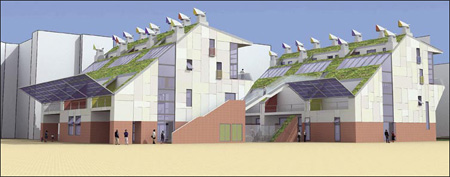'Green' rush
Emulating Britain's Beddington Zero Energy Development (BedZED) model completed in 2002 with the intention of creating a self-sufficient, sustainable community powered renewable onsite energy resources generated on site, the Shanghai Expo's ZED project could not be timelier for China.
 |
|
An artist's rendition of the ZED pavilion
|
In recognizing that low-carbon-producing economies are gaining momentum in the political arena, the country could not be more aware of the multifaceted benefits afforded to countries that respond favorably to global warming.

Last year during the Copenhagen talks on climate change, Beijing, for the first time, vowed firmly to reduce its greenhouse gas emissions. It promised to lower its emissions by 40 to 45 percent per unit of economic output by 2020.
While the Chinese effort is a far cry from London's plan to slash carbon emissions from residential housing to nearly zero by 2050, it has been credited as a step in the right direction for China, a country eager to show it is on board with the rest of the world's response to global warming.
Adding to that, President Hu Jintao late last month echoed the country's ongoing commitment to combating climate change, emphasizing that his leadership stop at short of nothing in realizing this end.
But, the 'green' parade is not simply an act of top-down rhetoric being exchanged amongst China's high-level leaders. Just as in other countries, celebrities, too, are playing their role, speaking out loudly on the issue, persuading ordinary people to do their part in lowering the world's carbon footprint.
In a dutiful bid, aimed at convincing others to think more consciously about the impact of their actions, Chinese film star Zhou Xun purchased 238 trees last May to offset the 19.5 tons of carbon dioxide emissions generated by her air travels in 2008.
Meanwhile, Ma Yun, founder, chairman and chief executive officer of Alibaba Group, acted in similar fashion when he planted trees near his hometown Hangzhou in an effort to counterbalance emissions produced by a swelling number of vehicles on the roads.
Big business
It seems that no one can escape China's latest wave of 'green' fever. Corporate suits, too, are invested in the matter.
In fact, it was the sponsorship of 30 domestic and international companies that advocate sustainable living in urban areas which made the ZED project's cost-feasibility possible. Subsequently, these companies will take the opportunity to unveil their newest developments when the doors open to China's first building of its kind mere months from now.
Such highlights are expected to include Greece-based NanoPhos SA's latest in nanotechnology. Like the insulation being used for the ZED building, its product is designed to aid in achieving desired indoor temperatures while reducing dependency on energy consumption.
Meanwhile, Synesthesia Phostech Corporation in Hong Kong will introduce its research findings in phosphor powder, a substance that enables plants to maximize its carbon dioxide-eradicating ability during photosynthesis.

